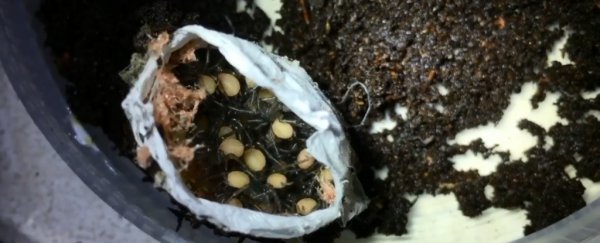You probably won't be surprised to hear that Australia is home to the world's most toxic spider.
It's called the funnel-web, it's aggressive, and its venom can kill an adult human in 15 minutes, a fact Australians get drilled into their skulls from a young age. And recently one man found the Aussie nightmare - a funnel-web egg sac in his very own backyard.
Instead of setting it on fire and running screaming (which would actually be really stupid because Australia bursts into flames with astonishing regularity), he did the sensible thing and notified his local reptile park - which was overjoyed to take it in.
Even though funnel-web spiders do bite people every year, thankfully there haven't been any deaths in decades, largely thanks to the availability of antivenom.
If the bite doesn't kill you, it can still make you very sick - symptoms include tingling around the mouth and tongue, goosebumps, salivation, watery eyes, vomiting, nausea, muscle spasms, fluid in the lungs, and hypertension. It's nasty.
That's why a whole bag of wriggling baby funnel-webs is actually an exciting find for researchers.
Experts at wildlife places like reptile parks can "milk" the spiders for their venom, which is then sent to a lab to produce antivenom.
Interestingly, dogs, cats and other non-primates are much more resistant to funnel-web venom, and can survive 100 times the human lethal dose. (It's not clear why primates are so acutely affected, either, as spiders use their toxins to kill the bugs they eat, not people.)
To produce antivenom, the harvested venom is injected into rabbits. This doesn't kill or even harm the animals, due to that aforementioned non-primate resistance, but it does induce them to develop an antibody against the venom.
The antibodies are then harvested from the rabbits as a serum and developed into the antivenom, which, when injected, binds to the venom in a human and neutralises it.
The venom of Sydney funnel-web spiders (Atrax robustus) is highly prized by scientists because it can be used to produce antivenom for the bites of several funnel-web species.
So this golf ball-sized sac of tiny, wriggling, baby Sydney funnel-webs - about 100 per egg sac - is a boon to the antivenom project, which relies on donated spiders to maintain supplies.
The reptile park is going to be raising the spiders and adding them to their milking program.
If you do see a funnel-web in the wild, the safest option is to give the aggressive little beastie a wide berth. If it's all up in your home space, call pest control. And if you do get bitten, head to the nearest hospital ASAP.
